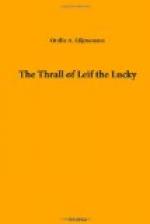In a chain of lengthening golden days and softening silver nights, the spring came.
The instinct which brings animals out of their dens to roam in the sunlight, awoke in the Norsemen’s breasts and made them restless in the midst of plenty. The instinct which sets birds to nest-building amid the young green, turned the rovers’ hearts toward their ice-bound home.
With glad applause, they hailed Leif’s proclamation from under the budding maple-tree:
“Four weeks from to-day, if the season continues to be a forward one, it is likely that the pack-ice around the mouth of Eric’s Fiord will be sufficiently broken to let us through. Four weeks from to-day, God willing, we will set sail for Greenland.”
The camp entered upon a period of bustling activity. Carpenters fell to work on the re-furnishing of the ship, until all the quiet bay echoed with their pounding. With infinite labor, the great logs were floated down the river and hauled on board. Porters toiled to and from the shore with loads of grain-sacks and wine-kegs. The packers in the store-houses buzzed over the wealth of fruit like so many bees. Even Kark the Indolent caught the infection, and clashed his pots and kettles with joyful energy.
“A little time more, and the death-wolf shall claim his due,” he sang over his work. “Only a little time more, and the death-wolf shall claim his due!”
On the morning of the last day in Vinland, Robert the Norman wrote the last word in the grotesque exploring record and laid down the brush forever.
“That ends the matter, chief,” he said slowly.
They sat in the larger of the sleeping-houses, as they had sat on that December night when the work was begun. But now a flood of yellow sunlight fell through the open door, and a flowering pink bush flattened its sweet face against the window.
Leif regarded him with dull, absent eyes. “Yes, it is ended,” he said, reluctantly; and was silent for so long that the young man looked up in surprise.
An odd expression of something like regret was on the chief’s face. As he met his companion’s glance, he laughed a short harsh laugh that had in it less of mirth than of scorn.
“It is ended,” he repeated. “And though I know no better than yourself why it is that I am such a fool, yet I find myself full of sorrow because it is finished. I feel that I have lost out of my life something that was dear to me.” He relapsed into another frowning silence; when he came out of it, it was only to motion toward the door. “No sense is in this,” he said, savagely; “yet the mood has me, hand and foot. I am in no temper to talk of anything. To-night we will speak of your reward. Go now and spend the rest of the day as best pleases you.”
He did not look up as his follower obeyed: he sat brooding over the great white roll as though it were the dead body of some one whom he had loved.




